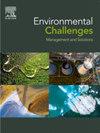Maintaining microbial and chemical quality in Australian rainwater tanks: Insights and global advancements
Q2 Environmental Science
引用次数: 0
Abstract
The use of rainwater tanks for potable purposes is increasing across rural and urban areas in Australia, driven by the challenges of a changing climate and the associated variability in rainfall patterns. These conditions exacerbate water insecurity and leave many Australians reliant on self-sourced, unregulated drinking water supplies. However, this shift introduces significant challenges in maintaining microbial and chemical water quality. This study conducted a scoping review following the PRISMA-ScR framework to identify and address these challenges in rainwater harvesting and reuse systems in Australia. Key findings highlight the impacts of prolonged dry periods, sludge disturbance, catchment and tank materials, and insufficient maintenance practices, particularly in the aftermath of the Millennium Drought. Global advancements in rainwater collection, storage, and treatment technologies were reviewed, with actionable recommendations for application in regional Australia. Emerging opportunities include sediment management optimization and the integration of internet or artificial intelligence-based technologies to enhance tank operation and maintenance. Additionally, public education and awareness are emphasized as essential for improving water quality and public health outcomes. This study provides a pathway for advancing the resilience and efficiency of rainwater systems, supporting their sustainable use in Australia’s evolving climate context.
维持澳大利亚雨水罐的微生物和化学质量:见解和全球进展
在气候变化的挑战和降雨模式的相关变化的推动下,澳大利亚农村和城市地区越来越多地使用饮用雨水罐。这些情况加剧了水的不安全,使许多澳大利亚人依赖于自备的、不受管制的饮用水供应。然而,这种转变在维持微生物和化学水质方面带来了重大挑战。本研究根据PRISMA-ScR框架进行了范围审查,以确定和解决澳大利亚雨水收集和再利用系统中的这些挑战。主要调查结果强调了长期干旱期、污泥干扰、集水区和水箱材料以及维护措施不足的影响,特别是在千年干旱之后。回顾了雨水收集、储存和处理技术的全球进展,并为澳大利亚地区的应用提出了可行的建议。新出现的机会包括沉淀物管理优化和基于互联网或人工智能的技术集成,以增强储罐的操作和维护。此外,强调公共教育和认识对于改善水质和公共卫生成果至关重要。这项研究为提高雨水系统的弹性和效率提供了一条途径,支持雨水系统在澳大利亚不断变化的气候背景下的可持续利用。
本文章由计算机程序翻译,如有差异,请以英文原文为准。
求助全文
约1分钟内获得全文
求助全文
来源期刊

Environmental Challenges
Environmental Science-Environmental Engineering
CiteScore
8.00
自引率
0.00%
发文量
249
审稿时长
8 weeks
 求助内容:
求助内容: 应助结果提醒方式:
应助结果提醒方式:


